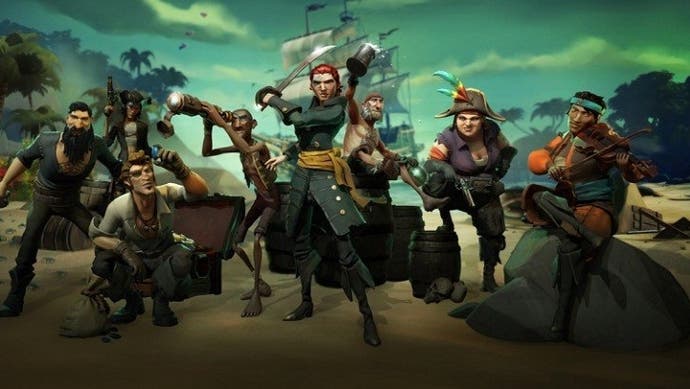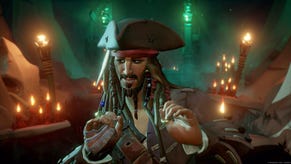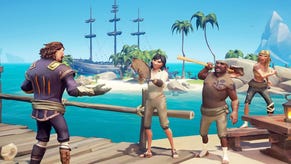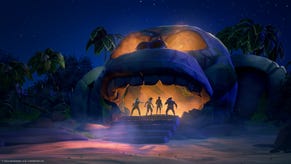Sea of Thieves is secretly a pen-and-paper RPG
Tide's rolling in.
I've been playing a lot of Sea of Thieves this week and so far it feels very much like being in an exciting new relationship and not being able to work out why your friends aren't as happy for you as you thought they would be - a heady combination of being incredibly enthusiastic, with just a slight creeping sensation that you're making a fool of yourself. I'm not overly bothered, mind you - I'm still having a lovely time - but it did get me thinking about what exactly draws me in so strongly while putting others right off.
The main complaint I've heard thus far about Sea of Thieves is that it's a very simplistic game - it gives you three mission types and sends you out into the wide world to repeat those ad nauseam. It's a crude description, even if it rings true, but it's also part of the reason I'm having such a great time. Sea of Thieves doesn't make any bones about what it is - it presents you with a basic structure, gives you all the tools you'll need to survive and turns you loose to make your own fun. In essence, it's a pen and paper role playing game.
Just like a pen and paper game, your time in Sea of Thieves is spent occupying a broadly defined character archetype. The trick is, as any role player knows, that it's how you carry yourself in that role that makes all the difference - the only catch about Sea of Thieves being that everybody is playing with the same archetype.
In the crew I've been playing with most frequently, I've become a sort of quartermaster. Or, rather, I've begun to role play one. My pirate is the one who's most concerned about the integrity of the hull, rushing down with a plank and a bucket at the first trickle of water or snap of a board. He's wholly obsessed with the trim of the sails, making the slightest of adjustments in pursuit of that satisfying whoosh as the canvas billows in the wind (I'm wholly convinced that if you can't get excited about trimming the sails, Sea of Thieves is not for you). He's a decent enough helmsman when the occasion calls for it and he's certainly seen his fair share of action, but in the midst of a naval battle he'll be keeping an eye on his own ship as much as the enemy's. While I'm always courteous in voice chat, I know full well this pirate is actually a proper curmudgeon - the type that wanders around grumbling about putting holes in his lovely ship and coming in to dock far too fast for his liking. I'm secretly playing an office manager on the high seas, in other words, and I think it's really very funny. This pirate doesn't have a name (yet) but already I can feel the edges of his personality and disposition as keenly as any pen and paper character I've rolled in the past.
And the thing is, there was nothing in Sea of Thieves that told me to invent that particular character, just in the same way the pen and paper games I've played in the past didn't spoon feed me my character backstory or motivations. These are all things I found for myself and enjoyed adopting as character constraints, using them as tools to shape my interactions with the game world - letting my character become that world, in other words.
It's the same reason I find Elite: Dangerous so compelling, a topic I covered in one of my very first videos for Eurogamer. Elite has systems upon systems but there's no driving force - it's about how you define yourself and where you make your own fun that counts.
Because yes, these experiences are quite simplistic, but then so are pen and paper games when you break them down as much as people seem keen to do with Sea of Thieves. At the most basic level, pen and paper RPGs are all about finding something with a different alignment to you and rolling dice until it's either been outwitted or killed.
What matters are the stories you tell in the margins; the nuance you bring to the experience that takes it from a stat bashing dungeon crawl, an interplanetary trade run or a nautical fetch quest into something more - something rewarding and nourishing and more authentically yours than a ready voiced, scripted protagonist could possibly hope to be.









